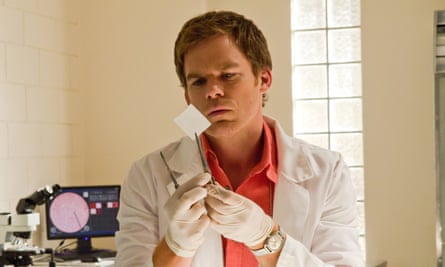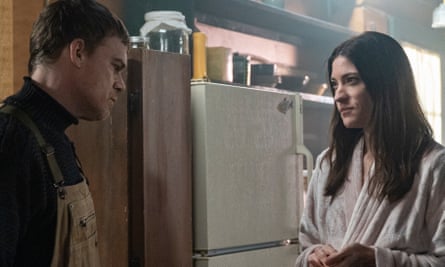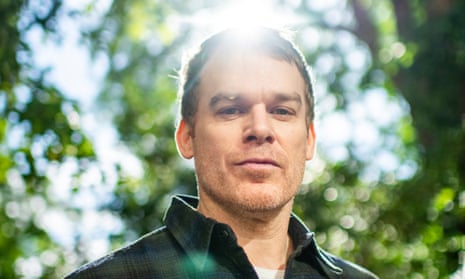Michael C Hall’s face is weirdly immutable – he looks no different now, at 50, from a decade or more ago, when he would loom down from giant posters as Dexter, the footloose serial killer. In fact, he looks pretty much the same as he did in Six Feet Under, playing David Fisher, right at the start of the century – he has one of those very structured faces, its features and angles carved so surely that there’s nowhere for them to disintegrate into.
Which is fortunate, since, in a highly unusual move, Showtime has brought Dexter back to life after an eight-year hiatus, and what looked like an extinction event, back in 2013. Dexter: New Blood has more complexity and less puckishness, certainly, than the first two series. He’ll talk about that in a minute, but first, he says: “I have to just respond to this text very briefly. My wife and I, our dog is sick and she wants to make sure she’s OK.” He married Morgan Macgregor, a writer, in 2016, after an elopement and brief marriage to his Dexter co-star Jennifer Carpenter in 2008. His first marriage was to the fabulous Broadway hoofer Amy Spanger in the early 00s.
I wonder whether mentioning his pet is a subliminal attempt to separate from the outset his own character from Dexter’s, which has dominated his life for so many years. Psychopaths are famously terrible with animals and would have no use for a poorly dog. “People often ask the question, ‘How are you like Dexter? How has Dexter affected your life or your experience of this or that?’ and I have no idea,” he says. “Probably in ways I couldn’t tell you. It’s really difficult to pinpoint what or how anything influences anything else.” It must be hard for an actor of serious intent to prepare for a role like Dexter, I suggest: it’s not as if you could go round committing murder as part of your process. He considers this quite carefully. “Even if I killed someone, I could never replicate his experience of killing because he doesn’t care. I’d have to find something else that I do and other people find disgusting.”

Like what?
“I can’t think of anything.”
OK, then what kind of dog is it?
“As far as we can tell, a mix of spaniel, long-haired dachshund and her ears are very much like a papillon.” So the dog definitely exists: not even Dexter could invent that mutt.
Hall speaks with extreme deliberation, weighing every word and leaving unabashed, gigantic pauses between one thought and the next. Just from a practical point of view, he is an absolute joy to interview, no baggy filler words, his voice as clear as a bell. If you didn’t own a TV, you would peg him immediately as a stage actor, classically trained. He was a graduate of New York’s Tisch School of Arts in the mid-90s, with a solid and swift progression from playing Shakespearean leads off-Broadway to roles such as the Emcee in Cabaret in Sam Mendes’s celebrated Broadway production.
Reviewers, stage and screen, have found his performances technical, varied, challenging and erudite, which makes his decision to return to Dexter a little surprising. Its overriding mood is really fun – a kind of vinaigrette of a show, very buoyant and emollient in its script and visuals, inescapably rather astringent with all the blood and whatnot. For those who have never seen it, Dexter by day is a forensic technician specialising in bloodstain pattern analysis, which is what makes him such a supremely competent and undetectable murderer – to really get under the skin of this plot device takes a lot of what the censors call “injury detail”.
He had reservations about reviving the role: “I didn’t want it to be some sort of nostalgia piece where we did a recontextualised version of the same sort of story arcs.” But the new season presents us with quite a different protagonist, one who, having tried to desist from his homicidal urges and monastically eschew all meaningful human contact, is on the cusp of realising that that’s not possible. “He claims that he’s not capable of authentic human emotion when we first meet him,” Hall recalls. “I don’t know that he’s the most reliable narrator on that front but it seems plausible.”
In those earlier seasons, he says, “It was fantastic to be completely unbound by any ethic beyond whatever you constructed for yourself. It was very fun. And I do still feel like there’s a dusting or a vapour of that energy that exists in him, and we see it. But it’s no longer pure, it’s cut with a lot more …” This is the only time he trails off in the middle of an analogy, I think because he doesn’t actually know what you cut drugs with.

It’s almost as though New Blood has taken a truism from psychotherapy – that you can’t numb any one emotion without numbing all of them – and applied it to a psychopath. He has to experience his bloodlust if he wants to have a relationship with his adult son, for instance. “So he continues to kill. I think he ultimately discovers he can’t successfully have his cake and kill it too.” The result is quite a profound exploration, not so much of morality as of emotion and the psyche, told through the medium of a cold-blooded killer. It’s pacy and thought-provoking, but a peculiar place to start, like trying to describe the weather through the medium of dance.
I also thought I divined a new dimension of social commentary since – (slight) spoiler alert – the season’s first victim is an entitled prick, built of money by birth and profession, and that’s why he had it coming. Hall is a bit sceptical about that, though. “I don’t think we have the market cornered on pinpointing the phenomenon of rich assholes.”
Anyway, TV has changed. Whatever the mood or moral message of a show, if it works and grabs people, actors must now expect to be in it for the long haul, for a role to be a career-defining event. And part of what changed the art form, lending it the rolling, epic, intricate quality that we now expect – indeed, to make it an art form in the first place – was Six Feet Under, which premiered in 2001, a box set about a family of funeral directors before the concept really existed (of box sets, not funeral directors). “HBO at the time seem to take that as their mandate, you know, to give audiences more credit. Alan Ball [the creator] tells the story of turning up with the pilot script and I think HBO literally said, ‘We love it but could you make it more fucked up?’ Whereas if you’d taken it to a more customary network executive, they probably would have said, ‘We love it, but what if they were veterinarians?’” Hall played the middle brother, David, a man “inherently conflicted and, lucky for me, his worst enemy was not the external world but himself. It was as rich and original a piece of writing as I’d had the invitation to audition for, in any medium.”
At the core of David Fisher’s conflict was his deep discomfort with his own homosexuality. As extraordinary as it sounds now, it was considered pretty risky, 20 years ago, to play a gay character, lest it remove you from the chessboard of straight romantic leads in the future. “Yes, it certainly felt more like a risky proposition,” Hall says, emphasising “risky” in a comic eye-roll at a less evolved age, “to commit to embodying a gay character for a long period of time. In terms of pigeonholing myself, or whatever.” That reputational jeopardy struck him as insignificant, meaningless, really, set against the role. “David was unique in the landscape. He wasn’t incidentally gay, he wasn’t comic relief, he wasn’t the shoulder to cry on, he didn’t have a little dog. He was a fundamental thread in the fabric of this story. I felt charged with a responsibility to do it justice.”

He says something, laughingly, about the Six Feet Under experience that I laughed at too, at the time, but reading back struck me as tremendously sad. “David was so distilled, and his life was a lot more interesting than my own. My real life seemed to be just driving to and from set and sleeping and eating, whereas my life as that character was always so consequential and fascinating.” His real life has been studded with tragedy – he grew up in North Carolina with his mother, a mental health counsellor, after his father, who worked for IBM, died when Hall was just 11. He had a sister who died in infancy. Then in 2010, when he was 38, he was diagnosed with Hodgkin’s lymphoma (he’s been fully in remission for a decade). His father had died of prostate cancer at age 39.
Life was coming at him quite fast at the time; he was filming a series of Dexter, and had to accept a Golden Globe in the middle of chemotherapy treatment, wearing a woolly hat. He told the New York Times back then: “I think I’ve been preoccupied since I was 11, and my father died, with the idea of the age 39: would I live that long? What would that be like?” And he has often situated his ease playing very repressed characters in his experience of repressing his grief at having lost his father so young. The other overhang is, to put it simply, quite a palpable wisdom and perspective, which leaves you thinking, maybe he’s the better judge of what’s sad and what’s funny.
Keen to return to the stage after Six Feet Under, he appeared as Billy Flynn in Chicago, and has quite a pedigree in experimental musical theatre: Hedwig and the Angry Inch in 2014; Lazarus (David Bowie and Enda Walsh’s musical) in 2015. He says that he never maps out his career choices, which is more or less what everyone says, but when he describes what he’s doing next besides Dexter, it does have a ring of credibility. He’s in a band called Princess Goes to the Butterfly Museum; they’re touring in Germany and the UK next month. They have an EP on Spotify; it’s the kind of music you like if you miss the Smashing Pumpkins but you don’t know why: which is to say, I love it. The rest of the band are Peter Yanowitz and Matt Katz-Bohen, both of whom he met on Hedwig. It’s reasonable to ask, does he maybe commit to projects more than regular people? He seems to be constantly eloping or setting up bands with his co-stars. “I’ve never been anyone but myself,” he says carefully. “So I don’t know what it’s like for other people, I don’t know what their relationship is with their work. But yeah, probably. Just in terms of time, the commitments I’ve made have been pretty substantial. I played the Emcee almost 500 times.”
One final reason to bring back Dexter was how incredibly annoyed fans and reviewers were by the season finale in 2013. It was commonly held to be so sloppy, so unbelievable, that it didn’t just fail on its own account, it tainted the entire show. To be fair, this critique felt a bit like that directed towards Game of Thrones: one part disappointment in the finale itself, nine parts distress that the show ever had to end. Hall starts off quite defensive of the ending in which he sort of ambiguously drives into a hurricane – “I certainly stand by what happened” – before diverting seamlessly into self-questioning: “We were probably all running on fumes by the end.” Whether he’s standing by it or apologising, he’ll own that part of the reason he agreed to revive Dexter was “to replace the unsavoury or unsatisfying taste that was left in people’s mouths at the end of the series”.
His own serious-mindedness collides with how seriously the world now takes television, to give him this overdeveloped sense of responsibility towards the roles he’s embodied – in a way, he says, “Dexter’s first victim was David Fisher.” So until a character comes along that can kill Dexter, we can look forward to much more new blood.
This article was amended on 26 October 2021 to amend the job description of Hall’s wife.
Dexter: New Blood will be available weekly from 8 November on Sky Atlantic and the streaming service Now
